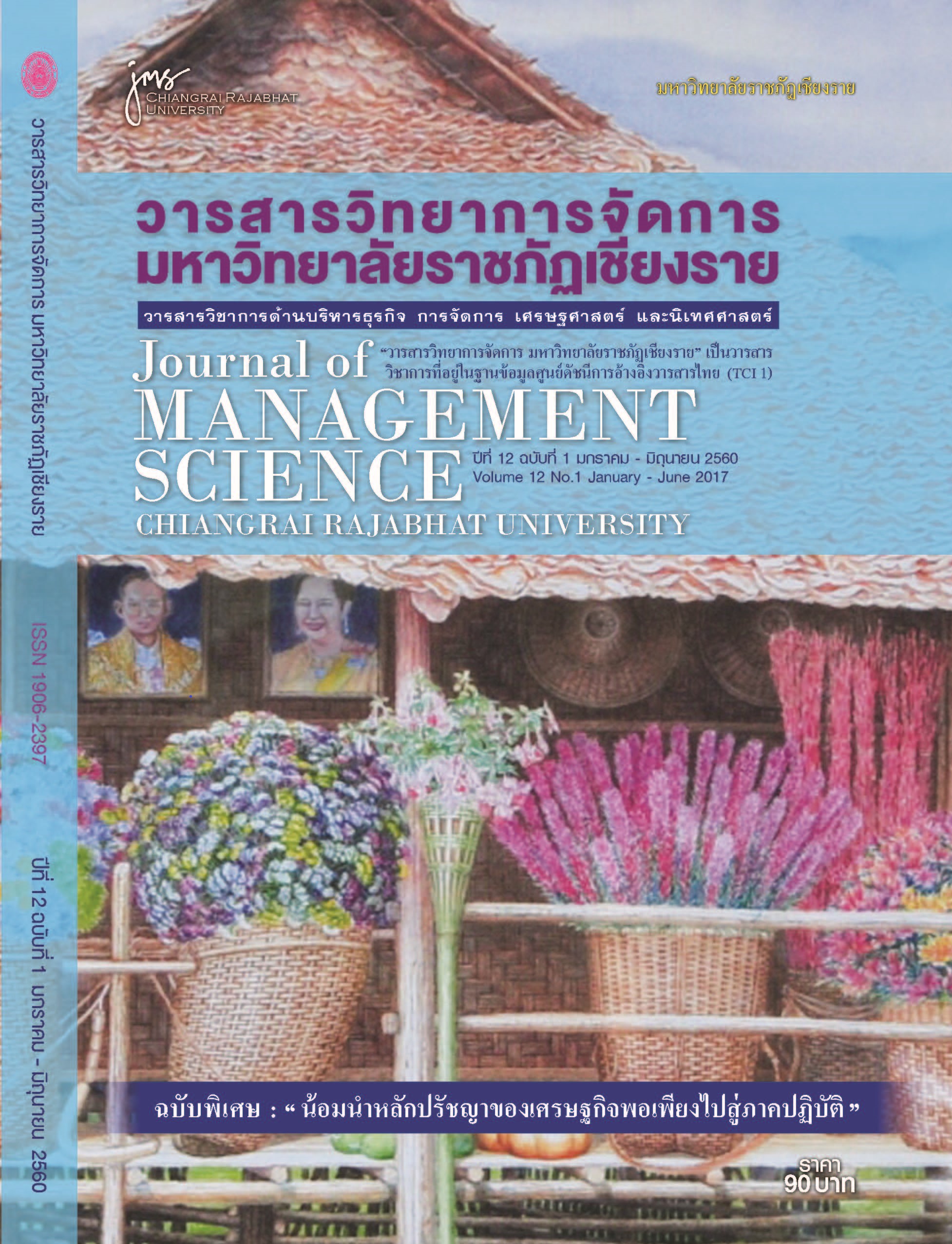Sufficiency Thinking: Principle of Conserving Cultural Heritage of North-Eastern Region toward Sustainability of Community Based Tourism
Main Article Content
Abstract
Community Based Tourism (CBT) is the one type of alternative tourism which is based on sustainable tourism and human right concept. This community based tourism focus on tourist responsibility to social capital both of natural heritage based and cultural heritage based which is tourism management capital. At the present time, Thailand has concerning in developing community based tourism. By considering in tourism policy and CBT the strategic plan year 2016-2020 of the government policy. North - eastern region or E-san region is the biggest region the Thailand. Thus, north – eastern region of Thailand has diversity, identity, and significance of cultural heritage. This region has develop community based tourism in many areas and used cultural heritage as tourism capital and resource. Thus, trends of sustainability in tourism and conserving of cultural heritage for next generation should base on the middle path of Buddhism religion which is directly to sufficient philosophy of His Majesty King Bhumibol Adulyadej.
Article Details
Views and opinions expressed in the journal do not necessarily reflect those of the editors.
References
คณะอนุกรรมการขับเคลื่อนเศรษฐกิจพอเพียง สำนักงานคณะกรรมการพัฒนาการเศรษฐกิจและสังคมแห่งชาติ. (2560). แนวคิดเศรษฐกิจพอเพียง. กรุงเทพมหานคร.
นิศา ชัชกุล. (2550). อุตสาหกรรมการทองเที่ยว. พิมพครั้ง ที่ 2. จุฬาลงกรณมหาวิทยาลัย.กรุงเทพฯ.
เนตรชนก คงทน. (2555). การสร้างและสื่อสารภาพลักษณ์การท่องเที่ยวเชิงวัฒนธรรมอารยธรรมลุ่มน้ำที่ราบสูงโคราชเพื่อการสื่อความหมายทางการท่องเที่ยว.คณะกรรมการวิจัยแห่งชาติ,กรุงเทพ.
ณัฏฐินี ศรีวงศ์ตระกูล (ทองดี) และคณะ. (2559). การยกระดับขีดความสามารถทางการแข่งขันและกลไกการจัดการตลาดการท่องเที่ยวโดยชุมชนแหล่งมรดกทางวัฒนธรรมลุ่มน้ำโขง ชี มูลในภาคตะวันออกเฉียงเหนือของประเทศไทย. สำนักงานกองทุนสนับสนุนการวิจัยและคณะกรรมการวิจัยแห่งชาติ,กรุงเทพมหานคร.
พจนา สวนศรี. (2556). การท่องเที่ยวโดยชุมชน...โอกาสในการเรียนรู้และแบ่งปันในอาเซียน. การสัมมนาเมื่อวันที่ 30 พฤษภาคม 2556
องค์การบริหารพื้นที่พิเศษเพื่อการพัฒนาการท่องเที่ยวอย่างยั่งยืน.(2559). แผนยุทธศาสตร์การท่องเที่ยวโดยชุมชน พ.ศ.2559-2563. กรุงเทพมหานคร.
Goeldner, Ritchie and Mcintosh. 1998. Tourism: Principle and Philosophies. John Wiley & Sons Australia (Brisbane). England.
Swarbooke.(1998). Sustainable Tourism Management. CABI Pub. (New York)
สถาบันการท่องเที่ยวโดยชุมชน.(2557). ชุมชนท่องเที่ยว. (ออนไลน์). แหล่งที่มา https://www.cbt-i.org/?&start=0&page=1&ge=travel&categoryTravel=®ionTravel=&provinceTravel=&keyword=&search=search.สืบค้นเมื่อ 17 กรกฎาคม 2557.
องค์การบริหารพัฒนาพื้นที่พิเศษเพื่อการท่องเที่ยวอย่างยั่งยืน (อพท.) ชุมชนท่องเที่ยว. (ออนไลน์). แหล่งที่มา https://www.dasta.or.th/dastaarea5/th/515/517 . สืบค้นเมื่อ 17 กรกฎาคม 2557.
มติชน. (2560). แนวคิดเศรษฐกิจพอเพียง. (ออนไลน์) แหล่งที่มา https://www.matichon.co.th/news/322579 สืบค้นเมื่อ 10
ธันวาคม 2559.
มหาวิทยาลัยเกษตรศาสตร์. (2560). แนวคิดเศรษฐกิจพอเพียง. (ออนไลน์). แหล่งที่มา : https://www.eto.kku.ac.th สืบค้นเมื่อ 28 มิถุนายน 2560)
องค์การสหประชาชาติ. (2560). With new Human Development award, Annan hails Thai King as example for the world. (ออนไลน์). แหล่งที่มา https://www.un.org/apps/news/ story.asp?NewsID=18625&Cr=Thai&Cr1= สืบค้นเมื่อ วันที่ 10 กุมภาพันธ์ 2560.


